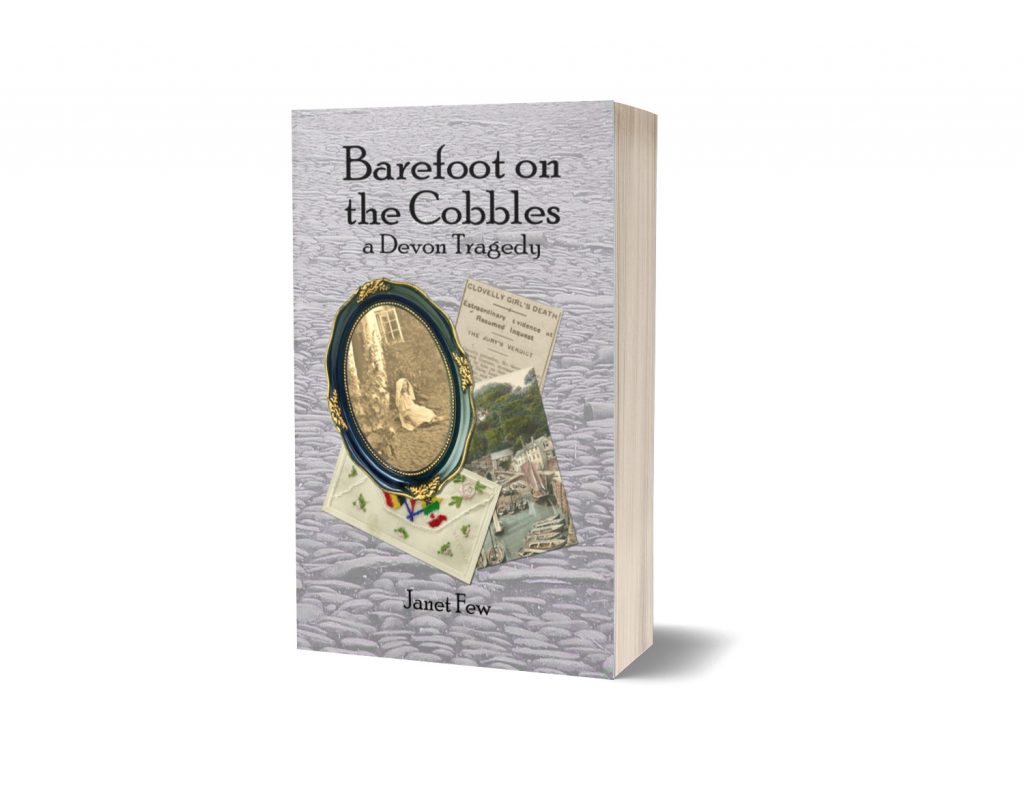This week’s opening lines comes from fellow Devon based author, Janet Few.
Pop your feet up for five minutes, and take a read of the first 500 words of Barefoot on the Cobbles…

Barefoot on the Cobbles – a Devon tragedy by Janet Few
In the euphoria of the armistice a young woman lay dying. Daisy had grown up, barefoot on the cobbles, in a village on the rugged North Devon coast; she was mindful of the perils of the uncertain sea. Her family had also been exposed to the dangers of disease and the First World War but for Daisy, it was her own mother who posed the greatest threat of all. What burdens did that mother, an ordinary fisherman’s wife, carry? What past traumas had led, inexorably, to this appalling outcome?
Vividly recreating life at the dawning of the twentieth century, Barefoot on the Cobbles is based on a real tragedy that lay hidden for nearly a hundred years. Rooted in its unique and beautiful geographical setting, here is the unfolding of a past that reverberates unhappily through the decades and of raw emotions that are surprisingly modern in character.
More details about the novel, including information about how to obtain a copy, can be found at http://bit.do/bfotc; alternatively, visit the publisher’s website https://bluepoppypublishing.co.uk. Opening Lines
Opening Lines
The magistrate was saying something. Polly, with throat tightening and heat rising, struggled to focus. He repeated his question but she was transfixed, unable to answer. Images and incidents from the past kaleidoscoped before her eyes. She saw her childhood home in the secluded Devon valley, her courtship with Alb, her firstborn being put into her arms. Her daughter, Daisy, skipping barefoot down the Clovelly cobblestones, living, loving, laughing. Daisy, bone thin and dying. Daisy, whose passing had somehow, in a way that Polly couldn’t comprehend, led to her being here in this crowded, claustrophobic courtroom, with every eye upon her. She must compose herself, pay attention, escape from this nightmare. All she wanted to do was dream of the past, both good and bad times but somehow more certain, safer, predictable. Times before everything began to spiral terrifyingly out of control.
Mr Lefroy, the solicitor, had assured her that she wouldn’t hang; this was a manslaughter charge not murder. Nonetheless, phantom gallows haunted Polly’s restless nights. Even when she calmed and the hangman’s noose receded, there was still prison. Prison meant Holloway. Polly’s hazy and fragmented impression of Holloway was gleaned from the terror-ridden stories of suffragettes’ force-feeding, that the pre-war newspapers had revelled in. Or would they say she was mad? Echoes of insanity had touched her in the past. There were barely acknowledged tales of people she knew who had been locked away. When compared to the prospect of prison, the asylum at Exminster was somehow more familiar but no less formidable.
Polly knew she must concentrate, breathe slowly, think about what she should say. Mr Lefroy had explained that all she needed to do was to keep calm and tell the truth, so difficult in this alien environment with all these well-to-do folk looking on. Faces. Faces whirled and blurred in front of her. There was Alb, shuffling in his chair and running his finger round the restrictive collar that she had helped him to fasten only this morning. He looked lost and bewildered, barely recognisable without his beloved trilby hat. Faces of the villagers, reproachful and remote. Mr Collins, her accuser, cold and self-possessed. Mrs Stanbury, gossiping neighbour, once a friend maybe but now here as a witness for the prosecution. Then, overlaying all of these, the vision of Daisy. Daisy looking like a young lady in her new hat, proudly setting off for her first job beyond the security of the village. Daisy fighting, screaming, twisting her head away from the spoon that held the broth that might save her. Daisy dying.
Was it really her fault, as they were saying? Polly wondered. Could she have done any more? She was a mother; mothers should protect their children. She had tried, she really had, struggled in vain to shield them all from harm. The enormity of her many failures consumed her. There was Bertie, not quite the full shilling, Violet and her troubles, the worry over Leonard while he’d been away at sea during…
***
You can find Janet at https://thehistoryinterpreter.wordpress.com/

Many thanks for sharing your first 500 words today Janet,
Happy reading everyone,
Jenny x

Lynne McVernon
Yep – certainly makes me want to read on. Good luck with Barefoot on the Cobbles, Janet.
Lynne McVernon
Yep – certainly makes me want to read on. Good luck with Barefoot on the Cobbles, Janet.